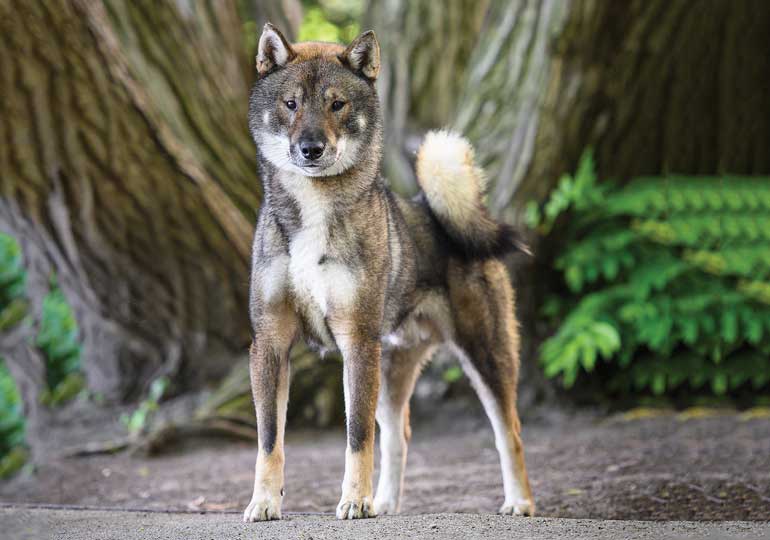Breeds
Shikoku

GROUP 6 - UTILITY
History
The Shikoku is one of the six native, Japanese spitz-type dogs. A medium-sized dog, native to the mountainous regions of the Kochi Prefecture on the Island of Shikoku. Developed by the Matigi (traditional hunters of Japan) the Shikoku is a prized hunter who is known for his tenacity in the face of large and dangerous game (in particular, wild boar) and his relative calm around the family and home.
Driven by Nihonken Hozonkai (Japanese Dog Preservation Society/NIPPO – Japan) the Shikoku was declared a “National Living Monument” in its native Japan in 1937.
Temperament
The Shikoku is a loyal companion, but it wise to remember that that their roots are that of working/hunting dogs. The Shikoku is typically calm with their family in the home but may be anything from overly friendly to aloof/standoffish with unfamiliar people.
Shikoku can be territorial. While capable of being social with other dogs, they will likely want to be the ‘boss’ which can come across as rude or obtuse in their interactions.
Energetic, independent thinkers with both inquisitive and impulsive sides, a Shikoku should be given ample exercise and mentally stimulating activities to minimise the mischief they may create to entertain themselves.
Health
A Shikoku’s life expectancy is 12-15 years. A generally healthy breed, the Shikoku has been known to suffer from hip dysplasia, seizures (most commonly idiopathic epilepsy) and an unknown degenerative neurological disorder (unknown as at 2021). The frequency in which these conditions occur varies greatly in different blood lines.
Maintenance
In relation to grooming, the Shikoku is relatively low maintenance for a double coated breed. Beyond weekly brushing, the occasional bath and blow dry will see the Shikoku looking his best. During coat blow (shedding of the undercoat, a bi-annual occurrence), it is advisable to bath weekly and brush daily to loosen and remove shedding coat.
As an intelligent and active working/hunting breed, the Shikoku has moderate to high exercise requirements. The Shikoku requires at least an hour of exercise each day as well as mental stimulation to prevent boredom.
Training
Positive and frequent early socialisation is imperative in raising a polite and well-adjusted Shikoku. Training this breed is not always easy, they are intelligent but also independent thinkers. Shikoku require short training sessions and positive reinforcement without exception.
While possessing a strong personality, harsh corrections will cause the Shikoku to be depressed and may even ‘shut down’ and stop listening to you altogether.
Suitability
The Shikoku is an ideal companion for people who lead active, outdoor lives and will be content/calm indoors if enough exercise is given. It must be remembered that as a primitive working/hunting dog, the Shikoku has high prey drive and as a result is not reliable off-leash. A secure yard of good size to run and play is a must.
When playing with other dogs, the Shikoku’s playing style can be quite rough, a reflection of their tenacity. They may miss queues the other dog has had enough which is often mistaken for aggression. You should carefully consider the temperament of your existing dog/s before adding a Shikoku to your home. If in doubt, consult with a breed club or breeder.
In Conclusion
Now you know a little about the Shikoku and have decided this is the dog for you, or you would like more information, please make contact with the breed club or your State controlling body for purebred dogs. They will be able to give you information about available puppies and also suggest dog shows where you can see the breed and speak to breeders. In this way you will gain a better perspective of the Shikoku and its needs and whether this breed would suit your lifestyle.
Image: Supplied by Shikoku Kennel van de Egmato - Netherlands. Dora Photography
Breeders
Sorry, there are currently no breeders advertising for this breed. If you are a registered Dogs SA breeder and wish to advertise here please create an advertisement here.

